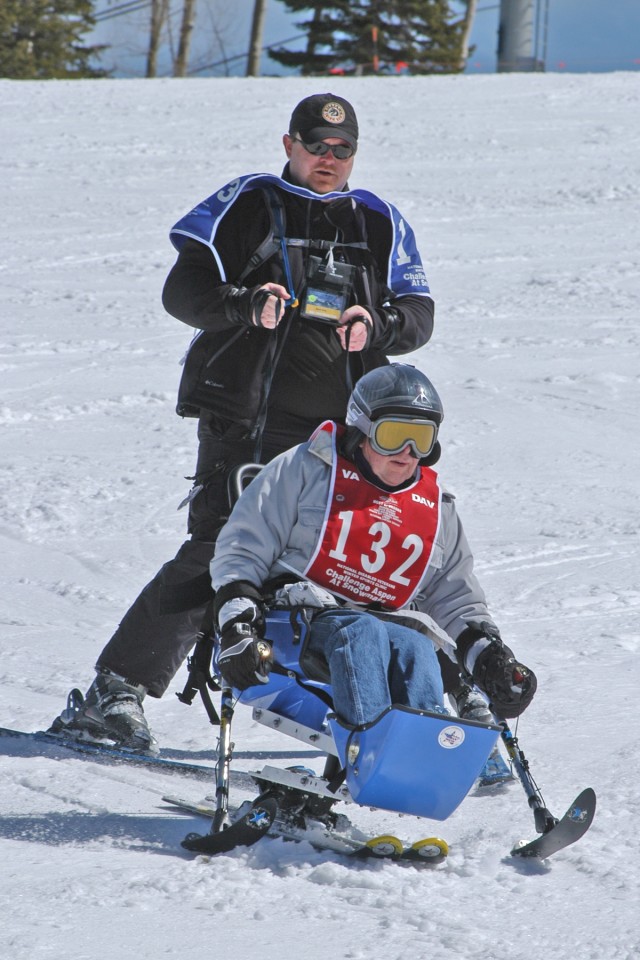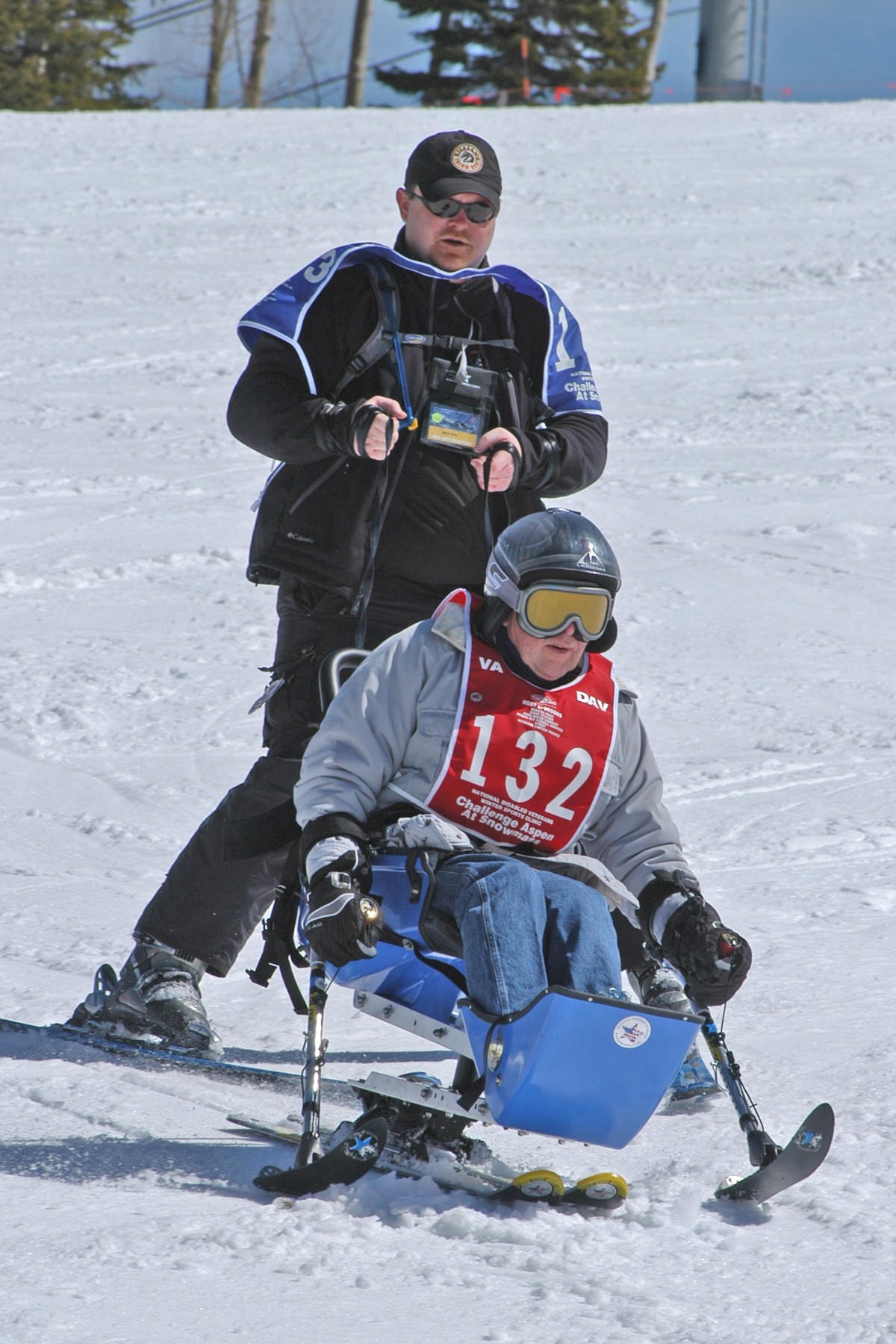
WASHINGTON (Army News Service, March 28, 2007) - Eighteen months ago, Spc. Roberto Cruz was shot by a sniper in Iraq. The bullet destroyed the main artery in his left arm, collapsed his lung and fractured a rib.
Doctors at Forward Operating Base Anaconda in Balad, Iraq, saved Cruz's arm. But at Walter Reed Army Medical Center in Washington, D.C., Cruz learned he would be paralyzed for life and never walk again.
Today, however, Cruz is preparing to ski. He will join more than 400 disabled veterans April 1-6 at the 21st National Disabled Veterans Winter Sports Clinic in Snowmass Village, Colo. Nearly 100 newly injured serivcemembers from operations Iraqi Freedom and Enduring Freedom are registered to participate, many for the first time.
The clinic provides disabled veterans with opportunities for self-development and challenge through sports and leisure activities. Participants will ski and receive instruction in adaptive Alpine (downhill) and Nordic (cross-country) skiing. Some - even a few visually impaired - participants will use traditional skis and snowboards. Those who can't ski standing will use adaptive equipment called mono-skis and bi-skis, which have a fiberglass shell, or seat, mounted on one or two skis.
Participants will also take part in such alternate activities as scuba diving, sled hockey, snowshoeing, snowmobiling, rock climbing, trap shooting, curling, fencing, golf, Snow Cat/Gondola Rides and a trip to the Hot Springs.
Ryan Coffield will travel to the clinic from Fayetteville, Ark. Coffield's infantry unit was deployed to Iraq in January 2005. In October 2005, Coffield was checking for contraband when one of the drivers was fired at by a nearby sniper. Coffield, a certified sniper himself, was sent to the rooftops to locate the shooter, but before he could do so, he was shot in the neck. The bullet broke through his vertebrae, leaving him a quadriplegic and requiring the insertion of two titanium plates and three steel rods in his neck.
Having worked hard learning to walk again, Coffield said he is looking forward to learning to snowboard.
"I've never really done it before, so we'll see how it goes," he said.
Alan Lewis of Milwaukee, Wis., will attend the clinic for the forth time. A bilateral below-the-knee amputee, Lewis was injured in Baghdad by a landmine July 16, 2003, where his infantry unit had been clearing buildings and trenches to secure the city.
"My first Clinic was a lot of fun, trying out my skills with skiing. The next year I tried snowboarding, which was much easier on my legs," Lewis recalled. "Now, I can't wait to get on the slopes and get some snowboarding in before the end of the ski season."
Believing that the event would only be a "fun" trip and a way to get his mind off of things, Lewis found something he didn't expect.
"After my injury I was missing my buddies, my unit. They were still fighting and training, and I felt like I lost that brotherhood and thought I would never reclaim that," Lewis said. "At the clinic, although we're not the same age, fight the same enemy, or even listen to the same music, we still share that camaraderie of being veterans."
The newest participants will join veterans who served in combat in Vietnam, Korea, Grenada, Panama, Bosnia, Lebanon and in the European and Southeast Asian theatres of WWII.
Joseph Hineman of Des Moines, Iowa, is one of six WWII combat veterans scheduled to attend this year's clinic. At age 20, he was drafted into the Army and served three years in the 99th Infantry Division.
Several months after the Battle of the Bulge ended, Hineman and a fellow Soldier found themselves under attack when their infantry unit tried to capture the bridge at Ramagan over the Rhine River.
"I was hit by shrapnel from a German mortar that burst in the trees. I got hit in the left thigh and right calf," he said.
Medical care was administered but the shrapnel still caused a severe infection. The infection grew worse and Hineman's life was in grave danger. In order to save him, doctors in Paris amputated his left leg above the knee. He was honorably discharged the following year.
At age 84, Hineman will be among the oldest participants at the clinic.
"The clinic is a great way to socialize with military peers from various backgrounds. We share a generational bond, because even though I'm much older, I can identify with them psychologically and physiologically because of our similar injuries," he said.
Sandy Trombetta, clinic founder and recreation therapist at the Grand Junction VA medical center, said veterans have much to gain from the clinic.
"They gain peer interaction, meeting men and women from past conflicts, and realize that they are part of a sacred fraternity," Trombetta said. "They witness what can be achieved from people like them with similar disabilities."
For more details on the clinic go to <a href="http://www.wintersportsclinic.org"target=_blank> www.wintersportsclinic.org</a>.
(Elaine Buehler works for the Department of Veterans Affairs.)

Social Sharing